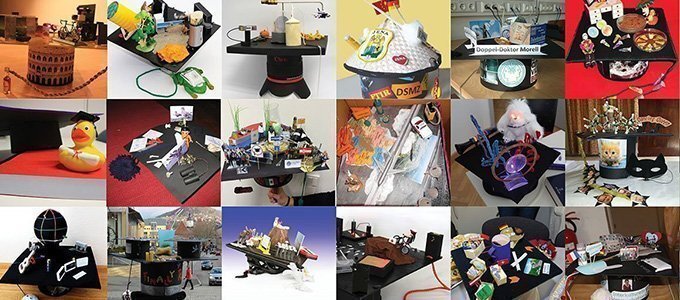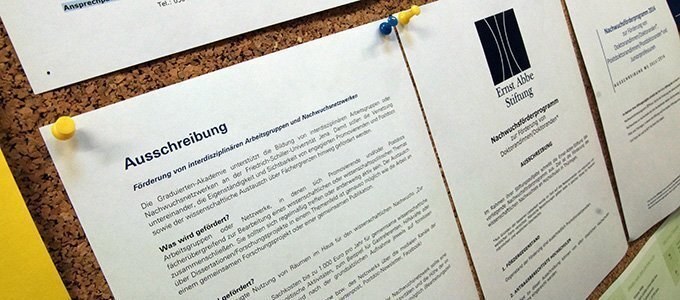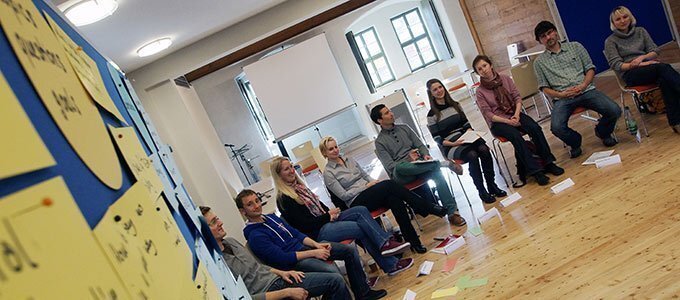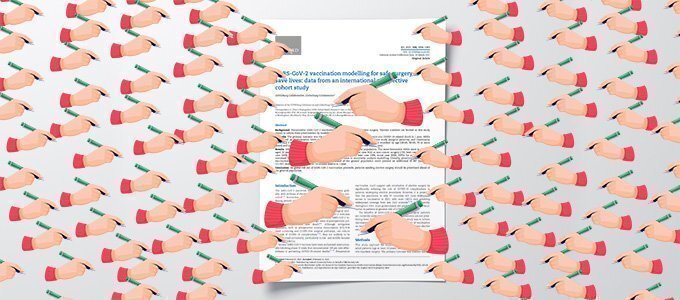|
 |
Events
- The
Doctoral Council of University of Jena is organizing
two events on the Academic Employment Law
(Wissenschaftszeitvertragsgesetz): On 25 April, at
18.00h in Lecture Hall 250 (university main
building), there will first be a presentation of the
current legal situation and then an analysis
of its effects on researchers. On 2 May, there will
be a panel discussion on possible changes to the
law. This will take place at 18.00h in the
Kleinen Rosensaal (Fürstengraben 27). Both events
will be in German. (Picture: istockphoto.com)
- The Thuringian Competence Network Research Data
Management is again offering an Online
Coffee Lecture on 26 April. This time,
various tools and software for research data
management will be presented. The event is free of
charge and takes place once a month in German
language on Wednesdays from 14:00 to 14:30.
- All researchers who work with data can attend the
Data
Science Day at the University of Jena on
May 10. At this event, they can show how Data
Science influences their research and how it
improves their work. This year, for the first time,
there will be a poster session. Posters can be
submitted until 15 April.
|
|
|
|
 |
Get
involved
- The German Rectors' Conference wants to bring more
academia to rural areas. For this purpose, it
has launched the "Heimspiel
Wissenschaft" project: Academics who
originally came from rural areas and are now doing
research at universities go back to their homeland
and talk about their academic work there.
- This year, the short film festival "cellu
l'art" also offers a stage for science
communication. In the festival series "Science in
Shorts, Shorts about Science", the multi-layered
relationship between artistic presentation methods
and science should be shown. Contributions are still
being sought: short films, but also moving images of
microscopes or satellite images can be submitted
until 10 April. For more information on the call for
entries, please contact Hanna
Hollweck.
- The photo
competition "Hats off!" will take place
again this year (see pictures above). In this
competition the most beautiful, self-made doctor
hats will be awarded. Photos of the hats can be
submitted from 1 May to 21 May. From 25 May to 15
June, you can vote for the photos online. For the
first time, the prizes will be awarded at the
Schiller Day.
|
|
|
|
 |
Announcements
- If you want to organise an academic event, you can
now apply for the postdoc funding programme "Organising
Academic Events". The programme supports
postdoctoral researchers in organising academic
events by providing funding for material costs of up
to 1,500 Euro per event. The deadline for
applications is 01 May 2023. As of this year, the
programme is only announced once a year.
- The profile line Liberty at the University of Jena
has announced the Liberty
Connect Fund. Up to 20,000 euros can be
applied for within the framework of this call for
applications in order to develop a third-party
funding proposal. The application deadline is 15
April.
- The Thuringian Ministry of Academic Affairs, in
cooperation with the Stifterverband, calls for
applications for ten "Fellowships
for Innovation in Digital University Teaching in
Thuringia". The fellowships are endowed
with 50,000 euros each. Applications can only be
submitted via the university management. The
university's internal application deadline is 26
April. Interested parties can find out more about
this funding opportunity on 18 April at 10:00h.
- The Thuringian Competence Network Research Data
Management is announcing the "FAIRest
Dataset" competition for the fourth
time! Research groups that have published a dataset
that corresponds to the FAIR principles
(Findability, Accessibility, Interoperability, and
Reuse of digital assets) can apply. The fairest
dataset will be awarded a prize of 2,000 euros. The
deadline for applications is 30 April 2023.
|
|
|
|
 |
Qualification
offers
There are still vacancies in the following online and
on-site workshops:
- Graduate Academy:
- Lehre Lernen:
- Service Centre for
Research and Transfer (in German):
- Competence Center Digital Research (zedif):
- Are you looking for courses on digital tools,
research data management or software? The
Competence Center Digital Research, short "zedif",
may have exactly what
you are looking for!
|
|
|
|
 |
This
may be of interest to you
- The Federal Ministry of Education and Research has
published
a first draft for the revision of the Academic
Employment Law ("WissZeitVG"). This law
regulates how long fixed-term employment is allowed
in the German academic system before and after the
doctorate - up to now, six years before and six
years after the doctorate have been allowed. The
draft now wanted to limit the permitted fixed-term
employment after the doctorate to three years. After
that, it should have been decided whether someone
would receive a permanent contract in academia or
leave academia. However, this proposal was massively
criticised, so that the ministry finally withdrew
the draft and wants to completely
revise it again. In a hastily convened "expert
round" a week ago, old familiar positions
clashed. As expected, answers to the most urgent
questions could not be found - including the
fundamental question of the point of fixed-term
contracts for postdoctoral positions in the first
place. A critical review of the expert panel can be
read on this website.
- For years, research on the Higgs boson was the
lone record-holder: in 2012, 2,932 authors jointly
wrote a paper on the subject; by 2015, the number
had risen to 5,154. Now, however, corona research
has surpassed physics: 15,025 authors have
jointly written a paper
on the effects of vaccination. The list of authors
has been attached to the article and is a 79-page
Word document. Overall, the role of so-called "hyperauthorship"
has been increasing in recent decades in certain
disciplines. The reasons for this are increased
collaborations, more complex questions, and the need
to pool statistical computing power. (Illustration
above: Graduate Academy)
- The gender pay gap is often criticised in
academia: In 2022, male professors received an
average of seven percent more salary than female
professors for the same jobs. Since the basic salary
is the same, this can only be due to negotiable
additional payments. The Federal Labour Court in
Erfurt has now
ruled in February that unequal pay cannot be
justified by the fact that one person negotiated
better than the other. However, it remains unclear
whether the ruling can be applied to the
performance-related pay of professors and whether
this system will be changed.
|
|
|
|
 |
News
from University of Jena
- The President of the University of Jena,
Prof. Dr. Walter Rosenthal, has been nominated for
the presidency of the German Rectors' Conference
(HRK). The HRK is one of the most important bodies
representing the interests of universities in
Germany. The election will take place on May 9 at
the HRK's General Assembly. The term of office is
three years. If Prof. Rosenthal is elected, he will
initially hold the office on a part-time basis for
several months and continue to serve as president of
the University of Jena. A finding commission would
then search for a successor.
- The University of Jena receives
funding from the "Innovation in Higher
Education" foundation for the advancement of its
e-learning portal. The university will receive
a total of 9 million euros in the funding period
from 2023 to 2026. A new online marketplace is to be
created where teachers and students can inform
themselves about the digital services and compile
them individually.
- The University offers a new conference
planning platform called Indico.
This not only allows you to create a conference
website and manage registrations, but also to rate
submitted papers and assign them to sessions.
- Jena University was founded in the 16th century
and was housed in the Collegium Jenense for the
first 300 years. This building was completely
destroyed in 1945. Immediately after the
destruction, the historical site was investigated
and many historical objects were secured (e.g.
professorial skeletons and grave offerings). An
interdisciplinary research team has now begun
to examine these objects. They enable a reconstruction
of university and student life in the early
modern period. Those who are interested in the
results and/or enjoy watching history
documentaries can find out more about the
history of the university in the four
quite professional documentaries (in German)
that have been made (picture above from third
episode "Pride and Prejudice").
|
|
|
|
 |
Latest
news from Jena
- Last year, Jena had
applied to become the home of the "Centre
for German Unity and European Transformation".
Now the jury's decision has been announced: The
center will be built in Halle an der Saale and Jena
drew the short straw. The Center should have been
built on Eichplatz – the development plan
had been adapted accordingly. After the refusal,
Jena's mayor had proposed to use part of the
Eichplatz as a place of transformation even without
federal funding. Whether this can be implemented
remains to be seen. The first steps in preparing the
Eichplatz
construction project have now begun
in Johannisstrasse (Picture above: Draft of the
Eichplatz Area, City of Jena).
- The city of Jena receives
funds from the federal government for a climate-adapted
redesign of Ernst-Abbe-Platz. The funding
amounts to 6.375 million euros. According to
Gerlitz, the city's head of urban development, the
funds will be used to create "another climate oasis
in Jena's urban space". At the same time, the climate
action plan "Jena climate neutral by 2025" could
not be passed in the city council. There had
been too many amendments and too little time for
discussion.
- There will be another comedy show at the
Haus auf der Mauer on 29 April: This time, the US
American Drew Portnoy will come to Jena and give two
shows: 7 pm in German and 9 pm in English.
Local comedians will perform as supporting acts.
|
|